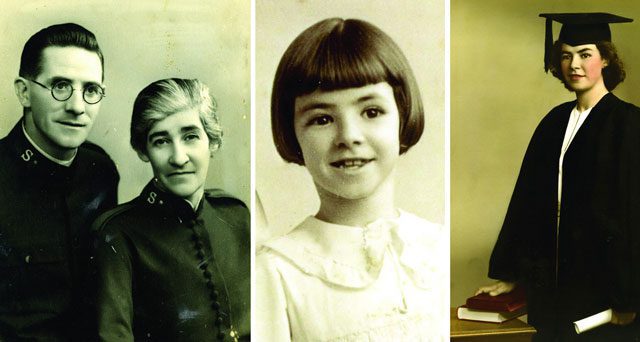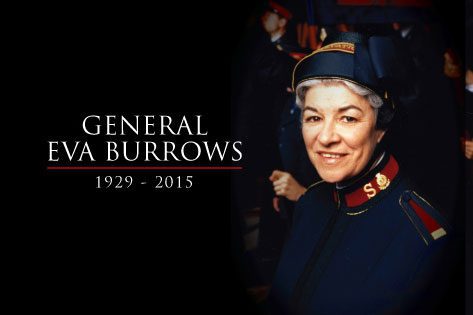
Celebrating the life of General Eva Burrows, the Army’s 13th international leader
By William Roberts, Commissioner –
A daughter of Salvation Army officer parents, Eva Evelyn Burrows was born Sept. 15, 1929, in Newcastle, Australia. She committed her life to God for service as a Salvation Army officer while she was studying at Queensland University in Australia. Having received a Bachelor of Arts degree in May 1950, with majors in English and History, she entered the William Booth Memorial Training College in London and was commissioned as a Salvation Army officer in 1951.
Her first appointment was to Portsmouth Citadel Corps, in the Southampton and Channel Islands Division of the British Territory, as an assistant officer. Following this initial appointment, Burrows was appointed as an officer teacher to the Howard Institute, a large mission station in Rhodesia (now Zimbabwe).

During 14 years at Howard Institute, Burrows became particularly concerned with the training of teachers for the network of Salvation Army schools throughout Zimbabwe. During her first homeland leave, she undertook a course at Sydney University for the degree of Master of Education, and presented her thesis on the training of African teachers in Zimbabwe.
Returning to Howard Institute, she became the first woman vice-principal and, from that appointment, she became the Principal of the Usher Institute, a secondary boarding school for girls. Under her innovative leadership, Usher Institute became well known in Zimbabwe.
In 1970, Burrows was appointed to London where she spent five years at the International College for Officers, first as vice-principal and then principal.
A significant impact on Burrows’s life was her appointment as leader of the Women’s Social Services in Great Britain and Northern Ireland from 1975 to 1977. It brought her into close touch with the effects of poverty and exploitation in the crowded cities of Britain.
Adaptation to a new culture became necessary when in January 1977 she became territorial commander for Sri Lanka. In less than three years, she had made such an impression in that predominantly Buddhist country that The Ceylon Observer said of her: “People like Eva Burrows grace any country they serve in. The Salvation Army has been very pragmatic and practical about its work, and Eva Burrows is a symbol of the Army’s attitude to the poor and meek.”
In December 1979, she became leader of The Salvation Army’s work in Scotland where she undertook a further three years of inspirational leadership. Then, after 30 years of officer service, in October 1982 Burrows was appointed to the first assignment she ever held as an officer in her homeland. Based in Melbourne, she served as territorial commander for the Australia Southern Territory. Her influence was such that the Prime Minister regularly consulted with her for her opinion and advice.
On May 2, 1986 the High Council elected Eva Burrows as the 13th General of The Salvation Army. She succeeded General Jarl Wahlström to office on July 9, 1986, and was welcomed for her energetic style of leadership, for her infectious enthusiasm and her impatience with anything inefficient. She was the focus and symbol of unity, and her varied international experience eminently equipped her for the role.
The restructuring of the Army’s work in the United Kingdom was a complex issue that had been considered a number of times over many years. With characteristic boldness and determination, Burrows addressed the issue head on and drove it through to conclusion. In the authorized biography “General of God’s Army” by Henry Gariepy it is recorded: “The international press of the Army headlined it ‘Revolution,’ the term coined by its chief architect, Colonel John Larsson. ‘With characteristic boldness,’ wrote Larsson, ‘the General has launched the Army’s most fundamental administrative change in its 125-year history.’ The restructuring of the Army’s International Headquarters and its British Territory was indeed revolutionary and radical.”
Under the Army’s constitution, Burrows was scheduled to retire from office in July 1991 but, as a result of the process whereby a General may be extended in office if more than two-thirds of the active commissioners agree to the proposal, she was asked to consider extending her term of office by two years. She agreed to do so, thus enabling her not only to preside over the early development of the fledgling United Kingdom Territory, but also to give vigorous leadership to another of her visionary initiatives—the return of The Salvation Army to a number of Eastern Bloc countries where it had previously worked. Burrows led The Salvation Army back into eastern Europe, with work being re-established in the former East Germany, Czechoslovakia, Hungary and Russia.
Burrows was honored in many ways during her worldwide travel, not least by the receipt of a number of honorary degrees. On Australia Day in January 1986 she was appointed an Officer of the Order of Australia (AO) with the citation reading: “In recognition of service to the temporal and spiritual welfare of the community and to social justice as the world leader of The Salvation Army.”
In 1994, this honor was upgraded to Companion of the Order of Australia (AC), with a similar citation. In 1988, she became an Honorary Doctor of Liberal Arts at Ewha Womans University in Seoul, and was awarded an Honorary LLD from Asbury University in the U.S. in 1988. In December 1993, she received an honorary Doctor of Philosophy from her alma mater, the University of Queensland. In January 2001, a Centenary Medal, “for service to the Australian community,” was awarded to her.
However, it was through her willingness to spend time with individuals, whatever their status, that Burrows became known to many as “the people’s General”—a title she did not seek, but one that she cherished. People were her passion. Her interest in people at every level of society was not a professional skill that she had developed. It was an integral part of her nature. Having met a person, she had no difficulty in recalling the name, the face, the family situation, many years later. In her biography, “Eva Burrows–Getting Things Done,” Wendy Green wrote: “She only needs to meet people once and she knows all about them. She recognizes them. Puts them in the right pigeonholes. When she was elected General, she received a telephone call from her former teacher, Mr. Adsett, one of her ‘shining people.’ She recognized his voice immediately, after nearly 50 years. Mention a place, a person, she can give you an instant rundown.”
Burrows’s passion in her public utterances was to preach Christ. This came out of her personal experience of him, which she described thus: “The focus and dynamic of my life is Jesus Christ. I will lift up Christ and would challenge all Salvationists to a commitment to Christ which makes them a powerful witness for him in the world today.” On another occasion she declared: “I do not preach Christianity; I preach Christ, as a living Savior.”
Dr. Billy Graham, with whom Burrows had a warm association, said of her: “General Eva Burrows is unquestionably one of the most respected and influential Christian leaders of our time. She is also an individual of great warmth, selfless compassion, unusual vision, and profound spiritual commitment. She embodies the spiritual commitment and dedication that led to the founding of The Salvation Army by William and Catherine Booth over 100 years ago.”
Burrows entered honorable retirement in July 1993, but hardly slowed down. She maintained a busy schedule of international travel and, when not traveling, could be found taking her place as an active soldier at the Army’s urban corps in Melbourne—not only attending Sunday meetings, but engaging with homeless youth during the week, leading Bible studies and being a good soldier of Jesus Christ. In addition, she served on the board of the International Bible Society from 1995 to 2005.
In recent months, Burrows’ physical strength began to wane, but her mental acuity, her spiritual vigor and her indomitable spirit remained unabated. To the end of her earthly journey, Burrows was an amazing role model and an inspiration to all who had the privilege of sharing her life. We thank God for the life of General Eva Burrows and the impact of her ministry in the name of Christ on so many people throughout the world. Our thoughts go out in prayerful support to her family and friends.
Burrows, one of nine children born to the late Majors Robert and Ella Burrows, is survived by one sister, Margaret Southwell, and many nephews, nieces, great nephews and great nieces.
As Gariepy, her official biographer, wrote, “General Burrows, you transcend your generation as one of the greatest leaders of Salvation Army history, a leader of vision who took the Army where it had not dared to go before.”
Salvationists of the world join me in saluting one of our great Army leaders of modern times—General Eva Burrows. “Servant of God—well done!”












